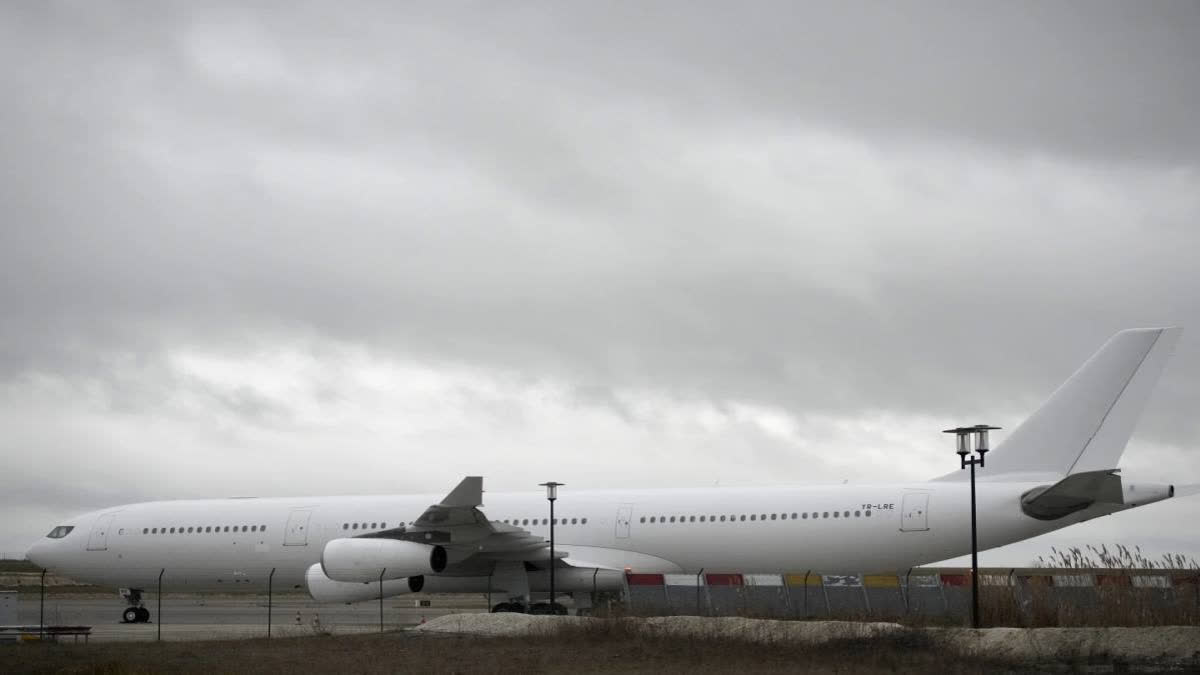Paris: India is leaving no stones unturned to ensure the safety of the passengers onboard the grounded flight in France.
Authorities on Saturday said it was working with the French government for an early resolution of the situation. A Nicaragua-bound flight carrying 303 people, mostly Indians, was grounded by French authorities during a technical halt at an airport near Paris over alleged "human trafficking".
The plane took off from Dubai with 303 passengers, including minors, was grounded at the Chalons-Vatry airport in Marne on Thursday. "French authorities informed us of a plane w/ 303 people, mostly Indian origin, from Dubai to Nicaragua detained on a technical halt at a French airport," the Indian mission said in a post on 'X'.
"The embassy team has reached & obtained consular access. We are investigating the situation, also ensuring the well-being of passengers," the mission said on Friday. On Saturday, the Indian embassy said it was continuing to work with the French government for the welfare of the Indians currently at the Varty airport and for early resolution of the situation. Embassy consular staff were stationed at the airport, the mission posted on X.
The Chalons-Vatry airport which is located 150 km east of Paris, serves mostly budget airlines. "Thank French authorities for working on this through the long holiday weekend," it said. According to a report in the Le Monde' newspaper, the civilian protection unit of the Marne department informed on Saturday that the flight had 13 unaccompanied minors and accompanied minors, with ages varying between 21 months and 17 years.
An earlier report noted that France's national anti-organised crime unit JUNALCO is in charge of the investigation. Special investigators are quizzing all those aboard and two people are already in custody pending further examination, the Paris prosecutor's office stated.
The prefecture in the northeastern department of Marne said the A340 aircraft, operated by Romanian company Legend Airlines, "remained grounded on the tarmac at Vatry airport following its landing" on Thursday.
After landing in France, passengers were initially kept on the aircraft, but then allowed to go out and given individual beds in the terminal building. The entire airport was cordoned off.
The prosecutor's office said an anonymous tip alerted that the flight was carrying people who could be victims of human trafficking. Passengers were shifted into the main hall of the small Vatry airport.
Cots were provided to them to stay overnight on Thursday.
Officials from a French organised crime unit, border police and aviation gendarmes are working on the case. The aircraft is owned by Romanian charter company Legend Airlines. A lawyer for the firm, Liliana Bakayoko, denied any involvement in the incident.
Legend Airlines "intervenes as a carrier", she said, adding that "the flight was carried out for "a client of the company". According to the lawyer, the airline verified "the conformity of the documents presented by the client, who must demonstrate that these people have the right to go to Nicaragua, and have valid passports".
A partner company that chartered the plane was responsible for verifying the identity documents of each passenger, and communicated the passengers' passport information to the airline 48 hours before the flight, Bakayoko told The Associated Press. "The company cannot check the criminal records of the people transported," said Bakayoko. "303 people is not a number that raises alarm. They are not locked in a truck without ventilation and food," she said.
The airline is unhappy," she said, adding: It is a significant economic loss, but their image also suffers. She said Legend Airlines is ready to cooperate as far as possible with the French authorities. We hope that within one or two days maximum the plane will be able to leave, said the lawyer. Legend Air has a small fleet of four aircraft, according to the Flightradar website.
French border police can initially hold a foreign national for up to four days if they land in France and are prevented from travelling on to their intended destination. French law allows for that period to be extended to eight days if a judge approves it, then another eight days in exceptional circumstances, up to a maximum of 26 days. Human trafficking carries a potential sentence of up to 20 years in France.



